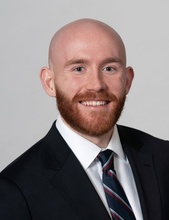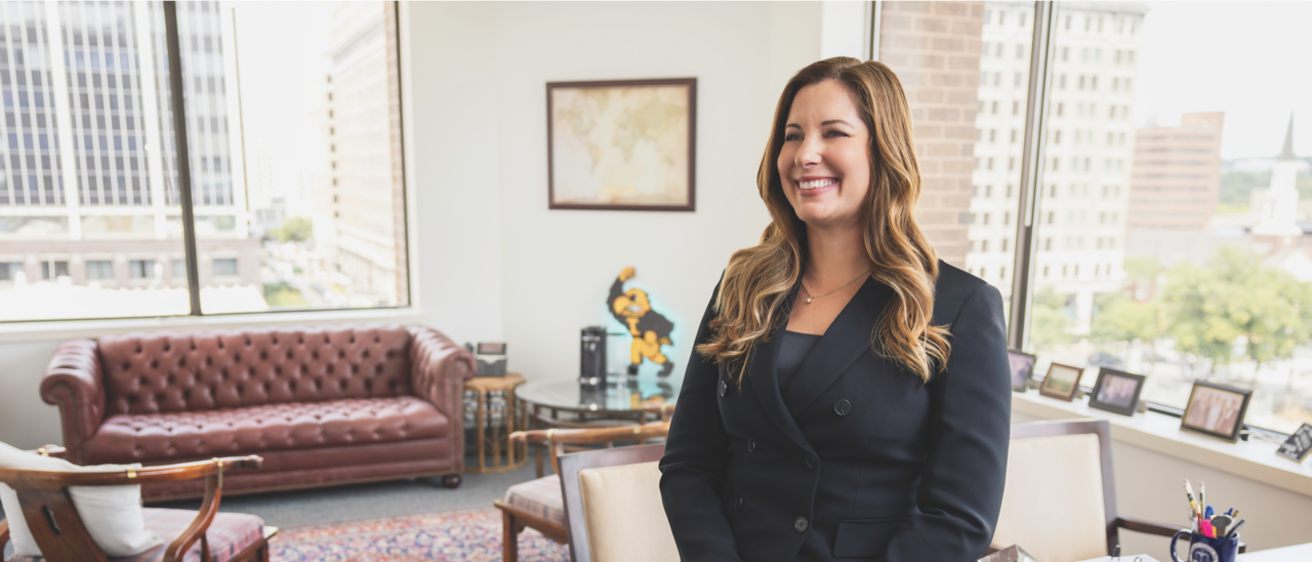For a young lawyer fascinated by transactional law, the road from Bangalore, India, to Wilmington, Delaware, ran through the University of Iowa College of Law.
For an Iowa native who became a passionate litigator, Iowa Law also led straight to Delaware. In major Wilmington law firms and judges’ chambers, Iowa alumni and current students are known to support one another through summer internships, clerkships, and associate positions.
How did such a close and productive relationship develop between a law school in the middle of the country and the East Coast state where the majority of U.S. public companies are incorporated?
“It’s something you would not have thought of: from Iowa to Delaware,” said Jenness Parker (04JD), the Iowa farmer’s daughter who has served as a litigator at Skadden, Arps, Slate, Meagher & Flom since 2005.
To understand Iowa students’ success in Delaware, it helps to grasp why the nation’s second-smallest state is its corporate law epicenter. The draw is the Delaware Court of Chancery, a unique institution where the judges—one chancellor and six vice chancellors (“chancellor” being the traditional term for a judge presiding in a court of equity)—are all experts in corporate law, as well as related areas like corporate finance, accounting, and economic analysis of law. They interpret the Delaware General Corporation Law, a statute that lays out the responsibilities and relationships of corporate directors and officers and their shareholders. They also enforce Delaware’s system of fiduciary duties, a body of judge-made law that requires directors act not only legally (meaning in conformity with the statute) but also equitably, (meaning in the best interests of the corporation’s shareholders).
The accumulated expertise of the judges on the Court of Chancery, along with their extraordinary work ethic, enables them to rule expeditiously on complex corporate matters that might confound otherwise capable judges, explained Professor Robert Miller, the F. Arnold Daum Chair in Corporate Finance and Law and associate dean for faculty development.
“In Delaware, you’re much more likely to get predictable, economically rational decisions in even the most complex corporate problems,” Miller said. “That’s why it is, by far, the court of choice for large corporations, financial institutions, and other sophisticated commercial parties, both in the United States and from around the world.”
Why are these sophisticated judges choosing clerks from the University of Iowa, and hearing arguments from alumni now working in Delaware law?
The top reason is probably the simplest: “We have really good students,” Miller acknowledged.
As one of the nation’s leading law schools, Iowa reliably produces the caliber of student that Delaware judges and firms need.
Then, too, the College of Law has long-standing ties to the Delaware judiciary. For years, the late Justice Randy Holland, the longest-serving judge on the Delaware Supreme Court, taught intersession seminars at Iowa and at Iowa’s London program.
“Randy was a tremendous judge, teacher, and person, and we were extremely fortunate that he chose to teach our students,” said Professor Gregory Shill.
The school honors that relationship by annually bestowing the Holland Award on a student author of an exceptional corporate law paper.
Holland wasn’t Iowa’s only connection with the Delaware judiciary. Former Delaware Supreme Court Chief Justices E. Norman Veasey and Myron Steele have both addressed students, as has Delaware Court of Chancery Vice Chancellor J. Travis Laster.
Moreover, preeminent attorneys practicing Delaware law visit regularly to present in Miller’s seminar on Deals. Recent semesters have seen presentations from partners at Wachtell, Lipton, Rosen & Katz; Sullivan & Cromwell; Orrick; Mayer Brown; Cooley, Gibson Dunn; and other prominent firms. These attorneys are based all over the country, but because Delaware law is so central to corporate law nationwide, they can all be said to be practicing Delaware law.
Scholarly publications also keep the law school visible to Delaware firms and judges. Since 1975, Iowa Law has published the Journal of Corporation Law, the nation’s oldest and one of its most respected publications specializing in corporate law.
The Delaware Court of Chancery regularly cites work by University of Iowa corporate law professors. Recently, the court quoted both Shill and Professor Mihailis Diamantis in its opinions. And Court of Chancery opinions have quoted Miller’s work more than 40 times, including twice this spring.
Finally, there’s Iowa’s growing alumni base in this area. As more of Iowa Law students arrive in Delaware and at firms practicing Delaware law elsewhere, they encourage future graduates, and the population snowballs.
“The alumni do a lot to maintain that connection and deepen it,” Parker said. “[Skadden] interviews at Iowa, and we have two people from Iowa who interned with us last summer who are starting this fall full time.”
Jenness Parker (04JD)
Daughter of Iowa Farmer Thrives in Wilmington
Jenness Parker grew up on a farm not far from her alma mater. Her father and grandfather, farmers and bankers, and her mother, a highly accomplished nurse and COO of her hometown hospital, inspired her interest in corporate law. At Iowa Law, then-professor Hillary Sale helped her learn to push for the excellence that has become a hallmark of her career.
“I learned how to rigorously prepare and how to distill things down to what really matters. That’s exactly what I do to prepare for arguments now,” Parker says.
The turning point of Parker’s life happened one spring break, when she filled the week with a seminar taught by Justice Randy Holland. Over the course of the intensive seminar, Parker and Holland became well-acquainted, and, since Parker was soon to graduate, the justice encouraged her to apply to be his clerk. Once he interviewed her, Holland hired Parker on the spot.
In Wilmington, Holland and his wife acted like surrogate parents to Parker.
“He used to say, ‘I told your mom I’d take care of you—so you have to eat your vegetables,” Parker laughs. After her clerkship, Parker moved on to her job at Skadden. In 2022, she was appointed to the Rules Committee of the Court of Chancery, and this year her name appears on The Best Lawyers in America list.
“None of what I do would have happened but for Justice Holland. And I would never have met him but for the University of Iowa College of Law.”
Apoorva Gokare (23JD)
From Bangalore to Wilmington—Via Iowa City
Growing up visiting her scientist father’s laboratory in Mysore, India, Apoorva Gokare seemed destined to become a scientist as well one day—until an upsetting experience changed her trajectory.

“My family faced constant intimidation from the land mafia,” she said. “They attempted to manipulate us into surrendering my father’s property for a trivial financial gain. This inspired me to pursue law, to defend our family’s rights and the rights of others.”
That experience motivated Gokare to become a lawyer. Earning a dual degree in business administration and law at Bangalore’s Alliance University, Gokare discovered her passion for transactional law.
While studying at Iowa Law in the Advanced Standing JD program, she learned about the importance of Delaware law from two sources: a corporate law seminar presented by Professor Robert Miller, and the Business Associations course taught by Professor Joseph Yockey.
For the one summer in her two-year program, Gokare set her sights on a Delaware internship. Staff at Iowa Law’s Career Services Office helped her prepare for interviews at the Delaware State Bar Association’s Diversity Job Fair.
When Vice Chancellor J. Travis Laster spoke at Iowa in her first year, Gokare had the opportunity to have breakfast with him, along with Peter Sotos (22JD), a third-year law student at the time and future clerk for Laster.
The preparation paid off, netting her an internship at top Delaware firm Morris Nichols.
Gokare wrapped up her time at Iowa with Professor Miller’s Deals seminar, which, she said, “strengthened my interest to go into the corporate counseling world.”
Now, she is headed back to Morris Nichols as a first-year associate. In Delaware, she hopes to connect further with alumni.
“We have a good alumni base there,” Gokare noted. “In the past two years, six or seven people I know graduated and will be in Delaware.”
Clerking for the Delaware Court of Chancery
Two Iowa Law grads gained valuable experience in top business court. Aided by a recommendation from Professor Robert Miller, Peter Sotos (22JD) received an offer to clerk for Delaware Court of Chancery Vice Chancellor J. Travis Laster after graduation last year. When Sotos called Vice Chancellor Laster to accept, Laster didn’t immediately pick up the phone. Only hours remained before the decision deadline.

“I started panicking,” Sotos recalled. Luckily, the Court of Chancery already had an Iowa alum clerking there: Matthew Strand (20JD). Sotos emailed him, and Strand ran into the vice chancellor’s office to congratulate him on his choice.
“This was news to the vice chancellor, who didn’t get my call. So technically, an Iowa Law connection made it possible to get my foot in the door and accept the position,” Sotos said.
Now nearing the end of his clerkship and looking ahead to his next career step, Sotos said: “Between this clerkship and an Iowa Law degree, there’s no firm out of reach.”

For his part, Strand has now completed his year at the court, where he clerked for then-Chancellor Andre Bouchard, and then after Bouchard’s retirement, for Vice Chancellor Lori Will.
During his time there, Strand learned to keep up with the fast pace and high stakes of the nation’s top business court.
Both Strand and Sotos wrote draft opinions, drawing on case law and the briefs filed by the parties. Getting from that first draft to the final opinion was then a collaboration in which students learned from the judges, Sotos said.
“It’s a mix of being a research assistant, editor, and co-author,” he said.
Other clerk duties include doing extensive research to answer any questions that come up, tracking case calendars, and helping the judge prepare for hearings and conferences.
“I was struck by how much responsibility I was given from the start,” said Strand, now an associate with Sullivan & Cromwell in New York.
